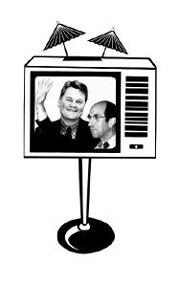SEATTLE CITY Attorney Mark Sidran has whupped King County Council member Greg Nickels in the campaign for mayor. The campaign isn’t over yet, of course. Also keep in mind that this doesn’t mean crafty conservative Sidran will win the election, since Pillsbury Doughboy liberal Nickels started with great advantages. But it’s not hurting the city attorney’s chances, either.
The latest KING 5 poll shows Nickels with a tiny lead—47 to 45 percent. Just after the Sept. 18 primary election, the same poll showed Nickels up by a whopping 10 points. So what’s Sidran done right and Nickels done wrong?
Sidran won the primary with a small but solid base: Republicans, conservatives, disaffected little guys, Sound Transit haters, and law and order lovers. He needed to reach out to Seattle’s political center— considerably further to the left than Sidran has ever ventured before. He has been effectively doing that by using “surprising” endorsements from the likes of Gov. Gary Locke and former Gov. Booth Gardner, lesbian mom and ex-City Council member Tina Podlodowski, and Capitol Hill’s gay legislator, Ed Murray, among others. For those of us who follow the Democratic Party’s feuds over issues and personalities, the endorsements were about as surprising as the M’s tanking in the playoffs, but most people don’t follow politics at all, much less closely, so the endorsements did shift their perception of the city attorney.
Sidran also feinted toward the center by easing up on his light-rail bashing. Suddenly, he doesn’t want to scrap light rail altogether but wants to build a better light-rail system (even “light-rail-or-death” Nickels could probably agree with that). This softer message will play better with women and Democrats, two groups Sidran desperately needs to win. In a different media environment, this flip-flopping might backfire—but there are no major media that will hold him accountable. In fact, the editorial-page writers of The Seattle Times are working so hard to elect Sidran, they may have to declare their activity an in-kind campaign donation.
Finally, Sidran used his edge in raising money from fat cats to buy an extra week of TV ads. His ads mixed it up: One was a slashing-attack spot and the other a soft sell, with Sidran and his wife walking along tree-lined streets musing about transportation. Guess what demographic the latter is supposed to appeal to.
Nickels has done some things right. He has kept pace with Sidran’s fund- raising, so he will equal his opponent’s TV blitz in the final week. The ad itself, however, won’t produce the spark this campaign needs.
Nickels, who relied solely on “your friend and neighbor” image in the primary, tried to add new elements to his message during the general-election campaign, but nothing worked. His effort to talk about issues fell flat for a couple of reasons: First, his proposals on neighborhood empowerment, economic development, and transportation were long and detailed and did not contain sound bite summaries. While there is no doubt that the mainstream media is unwilling to seriously discuss public policy, campaigns also need to find a quick and snappy way to get their message out. Second, Nickels’ proposals seemed seriously out of touch with the mood of the election—war, austerity budgets, and terrorism are on everyone’s minds. Nickels’ emphasis on neighborhoods and exciting new programs made it feel like he was running the 1997 election over again.
The Nickels campaign also failed to find a way to excite anyone about his 14-year record in office. Just the opposite—between the disastrous record of Sound Transit’s light rail, and the paucity of other achievements, Nickels’ record has played more like a liability than an asset.
The campaign also tried trotting out critics of Sidran’s record: Democrats, labor, musicians, environmentalists, and African-American leaders. The editorial pages of the dailies became hysterical, accusing Nickels of race baiting. While Nickels continues to critique his opponent’s tenure in office, the campaign was visibly shaken and became less aggressive.
Nickels still has a two tremendous advantages: a stronger field campaign than Sidran and grassroots networks of volunteers—Democrats, union members, environmentalists, firefighters, teachers—working on the councilman’s behalf. Quite a few independent groups are running their own advertising and get out the vote campaigns against Sidran or in favor of Nickels. While Nickels has not inspired the general public, these hard-core politicos are very pumped up about the race, mostly because of their disgust over Sidran’s record. These groups may provide the advantage that Nickels needs in a tight race.
In a normal year, you could safely say that a traditional Democrat, even a weak one like Nickels, would be a shoo-in in Seattle over a wanna-be Republican like Sidran. But after Sept. 11, with a war raging in Afghanistan and the postmaster general declaring our mail “a threat,” it is anything but a normal year.








